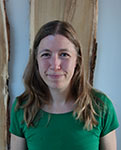Jennifer McConville

Presentation
I have a background in environmental engineering with a focus on sanitation and wastewater management. My PhD studied planning and decision-making processes for sanitation systems, primarily in West Africa. Since then, I have continued research related to sanitation and planning, with an increasing focus on resource recovery. I work with concepts of sustainability, life-cycle thinking, participation, serious gaming and decision-support frameworks to better understand and shape planning processes.
Teaching
I am the Study director for the Civil Engineering program in Environmental & Water Technology that is shared between SLU and Uppsala University.
I am also responsible for the following courses:
- On-site wastewater systems, nutrient recovery and sewage sludge treatment (in Swedish) - 5hp
- Selection of water and sanitation systems (in Swedish) - 10 hp
Research
I am currently involved in the following research projects:
- RECLAIM - a serious sanitation game
- SPANS: Sanitation Planning for Alternative Nutrient-recovery Systems
Cooperation
I am the SLU representative to "VA cluster Mälardalen" - a Swedish research and education cluster for research and learning in the water and wastewater sector.
Supervision
Supervisor of PhD students
- Abdulhamid Aliahmad: Socio-technical assessment of Technolgies for Urine Concentration (on-going)
- Chea Eliyan: Resources Recycling and Recovery for Sustainable Faecal Sludge Management Alternatives in Peri-Urban of Phnom Penh, Cambodia (on-going)
- Claudia Cossio Grageda: A Journey towards Sustainable Small Wastewater Treatment Systems in Low and Lower–Middle Income Countries, Chalmers University of Technology (2020)
- Ida Helgegren: Understanding the Roles of Stakeholders in the Water and Sanitation Sector- Implementation and Operation of Water Supply and Sanitation Systems in the Kanata metropolitan region, Bolivia, Chalmers University of Technology (2020)
Examples of supervised MSc students
- Matilda Gunnarsson (2021): Sustainability assessment of
urine concentration technologies
- Ylva Geber (2020): The potential of innovative dry source-separating urban sanitation technologies in Bolivia – a sustainability assessment
- Moustafa Bayoumi (2019): Making the case for leveraging sanitation and wastewater in climate action.
- Elina Persson & Therese Hågerup (2018): Shit Matters! Assessing sociocultural barriers and opportunities for upscaling adoption of human faeces derived fertilizers in central Uganda.
- Katja Norlin & Isabelle Wahlund (2017): Communication for acceptance of nutrient recycling from wastewater systems – a case study of the transition area Munga.
Selected publications
Full publication list is available at ResearchGate.
Latest publications:
McConville, Jennifer R., et al. (2023) Assessing the potential to use serious gaming in planning processes for sanitation designed for resource recovery. Environmental Science & Policy 145: 262-274.
Aliahmad, A., Harder, R., Simha, P., Vinnerås, B., & McConville, J. (2022). Knowledge evolution within human urine recycling technological innovation system (TIS): Focus on technologies for recovering plant-essential nutrients. Journal of Cleaner Production, 379, 134786.
Aubert AH, McConville J, Schmid A & Lienert J. (2022). Gamifying and evaluating problem structuring: A card game workshop for generating decision objectives. EURO Journal on Decision Processes, 10, 100021.
Lima, PM, Lopes,TAS, Queiroz, LM, & McConville, JR. (2022). Resource-oriented sanitation: Identifying appropriate technologies and environmental gains by coupling Santiago software and life cycle assessment in a Brazilian case study. Science of The Total Environment, 837,155777.
Eliyan C, McConville JR, Zurbrügg C, Koottatep T, Sothea K, & Vinnerås B. (2022). Generation and Management of Faecal Sludge Quantities and Potential for Resource Recovery in Phnom Penh, Cambodia. Frontiers in Environmental Science, 10.
McConville JR, Kvarnström E, Ahlström M & Niwagaba CB. (2022). Possibilities for changing to resource recovery in Kampala’s on-site sanitation regime. Resources, Conservation & Recycling, 181.
Eliyan C, Vinnerås B, Zurbrügg C, Koottatep T, Sothea K, McConville J. (2022) Factors influencing physicochemical characteristics of faecal sludge in Phnom Penh, Cambodia. Journal of Water, Sanitation and Hygiene for Development; 12 (1): 129–140.